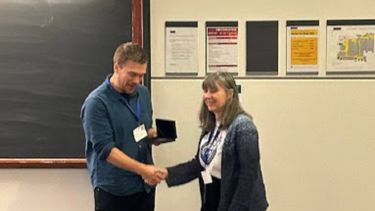is an organisation of archaeologists, botanists, civil engineers, geographers, geologists, soil scientists, zoologists and others interested in research into the problems of the Quaternary (the last 2.6 million years of Earthâs history). They organise a range of field meetings, workshops and discussion events and run an extensive grant scheme for members.
The Lewis Penny Award is awarded to an early career researcher who has been a member of the QRA for at least three years, who has made a significant contribution to any area of Quaternary research.
Senior Lecturer in Physical Geography at 91ÖąēĨ, Dr Jeremy Ely won this year alongside Dr Dulce Oliveira. He said âI am honoured to receive the Lewis Penny medal, and very grateful to everyone in the Quaternary Research Association for this award. I have always enjoyed working with others in the Quaternary community, and am very grateful to those who have helped me along the way."
Dr Ely has contributed to a wide range of topics, using multiple methods, across Quaternary Science and glaciology. He spins this lack of focus into a loose aim â to make palaeo observations useful for predicting the behaviour of contemporary ice masses in our warming world. Jeremy brings together techniques such as remote sensing, numerical modelling and fieldwork to grasp towards this goal. Highlights of his work include the discovery of widespread meltwater on the surface of the Antarctic Ice Sheet, an improved understanding of subglacial bedform formation, contributing to a reconstruction of the last British-Irish Ice Sheet and better methods for integrating numerical ice flow models with palaeo-data. He has contributed to over 45 articles in journals such as Nature, Nature Communications, Geology, and JQS.
Jeremy has been awarded over ÂĢ3,000,000 of funding from NERC as lead investigator and has contributed to numerous other funded research projects (including PALGLAC, an ongoing ERC funded advanced grant). He is currently lead investigator of a NERC highlight project (~ÂĢ2.5 million) to understand glacier and snow change across the Andes since the Little Ice Age, and the impact this has had upon water resources for the surrounding population.

